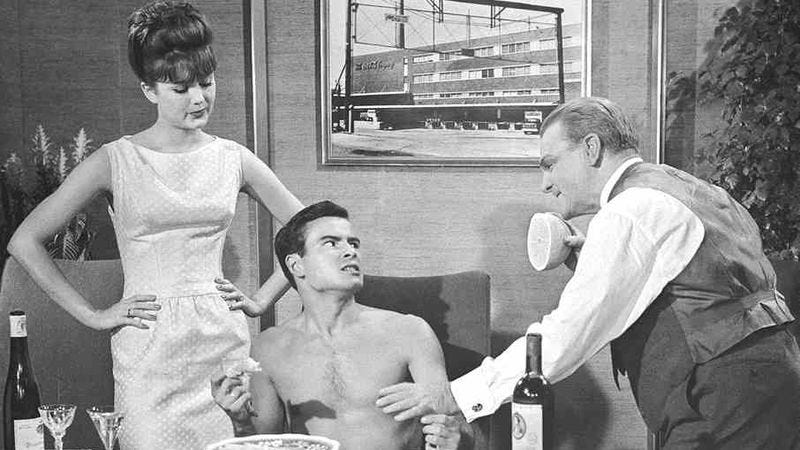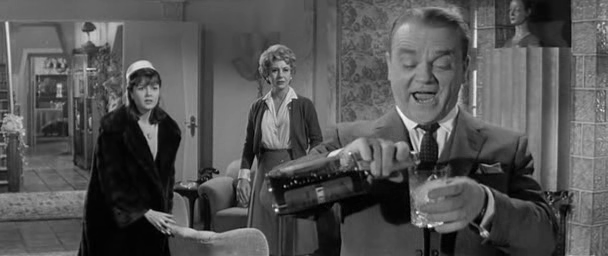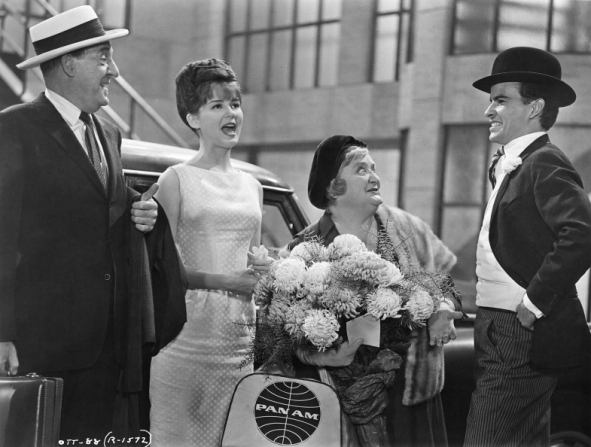← Back to Reviews
in
One Two Three
The artistry of Billy Wilder again behind the camera and a sparkling performance from legendary James Cagney in his final starring role make a winning combination in a deliciously entertaining 1961 comedy called One Two Three that takes a simple romantic comedy/generation gap comedy and sets it on a political canvas that probably ruffled some feathers back in '61.

Cagney plays CR McNamara, an executive for Coca-Cola who is working in East Berlin but is trying to get transferred to London as head of all European production when he gets a call from his boss asking him to take in his horny teenage daughter, Scarlett (Pamela Tiffin) for a couple of weeks. A couple of weeks turn into a couple of months and one morning wild child Scarlett shows up at McNamara's office announcing that she has married an East German communist named Otto Ludwig Piffl (Horst Buccholtz), who is basically an east German hippie. McNamara initially tries to get him out of Scarlett's life but when circumstances make that impossible, McNamara decides to do what he can to turn the young radical into son-in-law material.

Once again, Billy Wilder and longtime collaborator IAL Diamond have come up with another slightly complex comedy with a political conscience that never allows the politics to get in the way of the comedy...sort of a theatrical and a lot more intelligent Hogan's Heroes. The story doesn't paint Germans in the most flattering light, but the tongue is so effectively tucked into the cheek here that we don't take it too seriously. Fortunately, this look at American VS European and East Germany VS West Germany never gets in the way of what is a pretty conventional family comedy that looks a little more important than it is because of its setting on turbulent foreign soil.

Sometimes the political jabbing gets to be a bit much, but we never really notice because of the razor sharp performance by Jams Cagney in the starring role. Even at this very late stage of his career, Cagney demands complete attention in his creation of this smart, fast-thinking, ambitious central character, clearly a collaboration of the actor and the director. And it goes without saying that the occasional moments that Cagney is off screen the film screeches to a brief halt, but fortunately those moments are few.

Cagney gets solid support from the lovely Arlene Francis as his long suffering wife and there is a funny supporting turn from Leon Askin, the actor who actually got his 15 minutes a few years later playing General Burkhalter on the above referenced Hogan's Heroes. Tiffin initially grates on the nerves but relaxes into the role of Scarlett but Buccholtz' one-note performance is pretty annoying. There's also a brief appearance from Oscar winner Red Buttons, but it is the magic of Billy Wilder and James Cagney that make this one sparkle. Cagney disappeared from the screen for awhile after this, resurfacing 20 years later for a small role in the 1981 film Ragtime.
The artistry of Billy Wilder again behind the camera and a sparkling performance from legendary James Cagney in his final starring role make a winning combination in a deliciously entertaining 1961 comedy called One Two Three that takes a simple romantic comedy/generation gap comedy and sets it on a political canvas that probably ruffled some feathers back in '61.

Cagney plays CR McNamara, an executive for Coca-Cola who is working in East Berlin but is trying to get transferred to London as head of all European production when he gets a call from his boss asking him to take in his horny teenage daughter, Scarlett (Pamela Tiffin) for a couple of weeks. A couple of weeks turn into a couple of months and one morning wild child Scarlett shows up at McNamara's office announcing that she has married an East German communist named Otto Ludwig Piffl (Horst Buccholtz), who is basically an east German hippie. McNamara initially tries to get him out of Scarlett's life but when circumstances make that impossible, McNamara decides to do what he can to turn the young radical into son-in-law material.

Once again, Billy Wilder and longtime collaborator IAL Diamond have come up with another slightly complex comedy with a political conscience that never allows the politics to get in the way of the comedy...sort of a theatrical and a lot more intelligent Hogan's Heroes. The story doesn't paint Germans in the most flattering light, but the tongue is so effectively tucked into the cheek here that we don't take it too seriously. Fortunately, this look at American VS European and East Germany VS West Germany never gets in the way of what is a pretty conventional family comedy that looks a little more important than it is because of its setting on turbulent foreign soil.

Sometimes the political jabbing gets to be a bit much, but we never really notice because of the razor sharp performance by Jams Cagney in the starring role. Even at this very late stage of his career, Cagney demands complete attention in his creation of this smart, fast-thinking, ambitious central character, clearly a collaboration of the actor and the director. And it goes without saying that the occasional moments that Cagney is off screen the film screeches to a brief halt, but fortunately those moments are few.

Cagney gets solid support from the lovely Arlene Francis as his long suffering wife and there is a funny supporting turn from Leon Askin, the actor who actually got his 15 minutes a few years later playing General Burkhalter on the above referenced Hogan's Heroes. Tiffin initially grates on the nerves but relaxes into the role of Scarlett but Buccholtz' one-note performance is pretty annoying. There's also a brief appearance from Oscar winner Red Buttons, but it is the magic of Billy Wilder and James Cagney that make this one sparkle. Cagney disappeared from the screen for awhile after this, resurfacing 20 years later for a small role in the 1981 film Ragtime.
